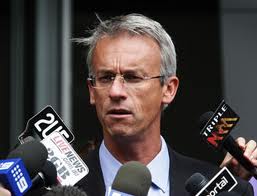By Andrew Warshaw
September 17 – Six people have been charged in relation to Australia’s biggest match-fixing scandal, prompting FIFA’s former anti-corruption specialist to call for greater global co-operation.
The charges relate to an alleged match-fixing ring estimated to have reaped more than $2 million from manipulating results of the Southern Stars club which plays in the Victorian Premier League.
It follows a police investigation that began last month based on information from Swiss-based sports fraud detection agency Sportradar, which was passed on to Australian football officials.
Two British players, Joe Woolley and Reiss Noel, are among those charged with betting-related corruption. They are both understood to have moved to Australia in July. Gerry Gsubramaniam, a Malaysian citizen described as the “contact point” between Stars staff and Asia betting syndicates, has also been charged. The other three have yet to be named.
Football Federation Australia (FFA) chief executive David Gallop (pictured) said the limited media coverage of semi-professional football meant such competitions were easy targets.
“Probably fair to say that this highlights the fact that lower league games, which aren’t under the scrutiny of things like live television broadcast, are potentially more susceptible to this kind of activity,” Gallop said. “It is clearly distressing for everyone in Australian sport – we have known this threat exists.”
At least five games had been identified by Sportradar as being “highly suspicious”. Southern Stars FC president Ercan Cicek said many of the original 10 players arrested were from the UK and had been playing in Australia during their off-season.
Chris Eaton, FIFA’s former head of security who now helps run the Qatar-based International Centre for Sports Security and whose organisation has been helping the local authorities in Australia, said the case showed nowhere was safe from match-rigging.
” It is vital that the interests of football, police, sport betting and relevant regulators both combine and internationalise information and cooperation in some way, and soon,” he said.
“Criminal match fixing remains big, global and organised. The detection, disruption and deterrence of it must be equally as big, global and organised. As of today it is not.”
Contact the writer of this story at moc.l1745302204labto1745302204ofdlr1745302204owedi1745302204sni@w1745302204ahsra1745302204w.wer1745302204dna1745302204


